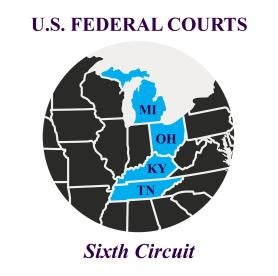In an important decision limiting the reach of the Federal Anti-Kickback Statute (42 U.S.C. 1320a-7b(b)) (“AKS”) and its application to violations of the False Claims Act (31 U.S.C. 3729, et seq.) (“FCA”), the U.S. Court of Appeals for the Sixth Circuit (“Sixth Circuit”) recently contended that, “[w]hile the word remuneration may be broad, it customarily requires a payment or transfer of some kind,” and mandated “but-for” causation standard for determining whether claims paid by Federal health care programs were tainted by an AKS violation such that they violated the FCA. See U.S. ex rel. Martin et al. v. Hathaway, et al., Case No. 22-1463, at 11 (6th Cir.) (appeal from 1:19-cv-00915, ECF Doc. No. 108 (W.D. Mich.)) (emphasis added).
At issue on appeal to the Sixth Circuit was an alleged quid pro quo arrangement—a hospital would not hire a certain physician at the request of another physician on staff and, in return, the requesting physician would continue his historical practice of referring patients to the hospital. The Sixth Circuit concluded that the hospital’s refusal to hire the physician could not be deemed to be “remuneration” to the requesting physician because there was no transfer of value to that physician. Hathaway, Case No. 22-1463 at 9–10. The Sixth Circuit noted that the Department of Justice’s (“DOJ”) position that any action that resulted in a financial benefit to a referral source could violate the AKS was very difficult to limit in a rational manner. Id. at 5–9, 14–16. The Sixth Circuit specifically noted:
“[I]t lacks a coherent endpoint. Consider the hospital that opens a new research center, purchases top of the line surgery equipment, or makes donations to charities in the hopes of attracting new doctors. Or consider the general practitioner who refuses to send patients for kidney dialysis treatment at a local health care facility until it obtains more state-of-the-art equipment. Are these all forms of remuneration? Unlikely at each turn.”
Id. at 9. (emphasis added). “Measured by this definition,” the Sixth Circuit concluded, “the complaint [by the plaintiffs] fail[ed] to allege a cognizable kickback scheme.” Id.
The Sixth Circuit further determined that the referrals, if any, did not “result from” the AKS violation and, thus, could not be a basis for an FCA violation. Id. at 12–16. In so holding, the Sixth Circuit joined that which has been consistently held by the Eighth Circuit: “resulting from” means “but-for” causation. Id.; U.S. ex rel. Cairns v. D.S. Medical LLC, 42 F.4th 828, 835 (8th Cir. 2022). Because there was no change in the status quo, the Sixth Circuit concluded that no referrals resulted from the failure of the hospital to hire the physician as requested by the other physician. Hathaway, Case No. 22-1463 at 11.
The Hathaway decision reflects continued judicial concern about the reach of the AKS and the FCA. While the Sixth Circuit noted that the Third Circuit had rejected the “but-for” application of the AKS for purposes of demonstrating FCA violations, there appears to be a trend toward using a “but-for” rule. (We note that the Third Circuit held that only a causal link between the remuneration and referral need be shown. See U.S. ex rel. Greenfield v. Medco Health Sols., Inc., 880 F.3d 89, 98, 99–100 (3d Cir. 2018).)
If the “but-for” rule is adopted, certain members of Congress may seek a legislative adjustment to the AKS to clarify its intent. For now, outside of the circuits requiring use of the “but for” standard, DOJ is likely to continue to use other definitions such as “tainted by” an AKS violation or “provided in violation of” the AKS to prove up remuneration in exchange for a referral for purposes of demonstrating an FCA violation. Hathaway, Case No. 22-1463 at 13. Similarly, one may assume that DOJ and the Office of the Inspector General for the Department of Health and Human Services—the Federal agency that regularly interprets the AKS for purposes of issuing advisory opinions and for purposes of DOJ’s investigations of FCA violations—will maintain their longstanding view that any action by a recipient of referrals to financially benefit a referral source, even if it does not result in a direct “transfer” of value to that referral source, could be violative of the AKS.



 i
i


